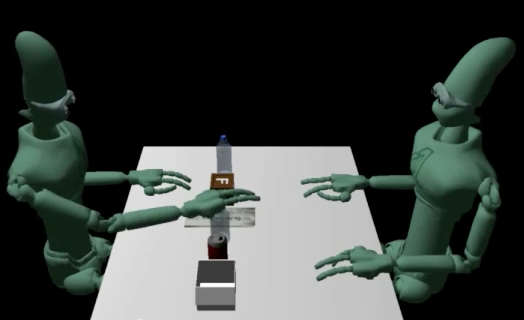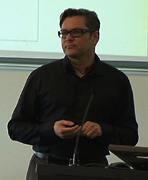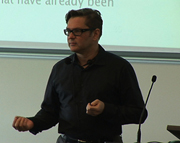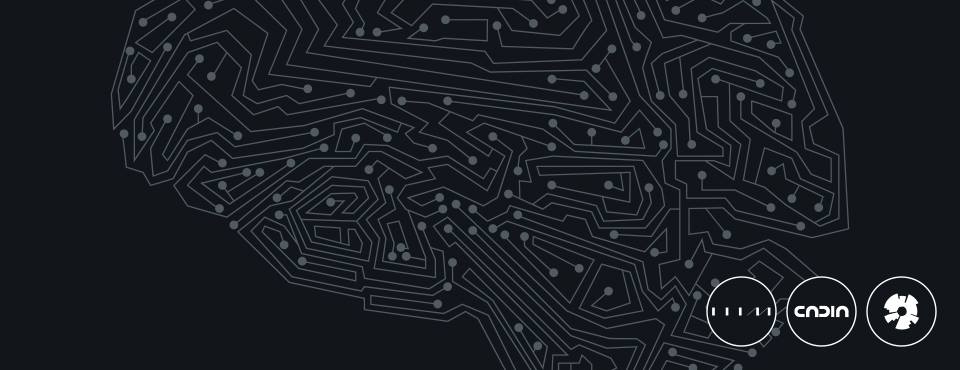As we announced a few weeks ago, IIIM is reviving the AI Festival, together with Reykjavik University’s CADIA. The schedule is now up on the website so that visitors can attend presentations in subfields relative to their interests. So join us for an afternoon of lectures and discussion on Friday October 31 from 2-6 pm. All the lectures will be in English and the festival is open to everyone. Continue reading Schedule Revealed: AI Festival 2014
Tag Archives: kristinn
Kristinn R. Thórisson interviewed on Nýsköpun-Íslensk vísindi
 IIIM’s Director, Dr. Kristinn R. Thórisson was recently interviewed on the Icelandic TV show Nýsköpun–Íslensk vísindi. During the interview, Dr. Thórisson discussed his work on a project that brings ideas once confined to the realm of science fiction closer to reality. The international research group, led by Dr. Thórisson, developed a computer that can learn continuously in real-time, replicating human learning as closely as possible. In the interview, Dr. Thórisson explains the parameters that were setup for the project and the solutions that the group developed. Continue reading Kristinn R. Thórisson interviewed on Nýsköpun-Íslensk vísindi
IIIM’s Director, Dr. Kristinn R. Thórisson was recently interviewed on the Icelandic TV show Nýsköpun–Íslensk vísindi. During the interview, Dr. Thórisson discussed his work on a project that brings ideas once confined to the realm of science fiction closer to reality. The international research group, led by Dr. Thórisson, developed a computer that can learn continuously in real-time, replicating human learning as closely as possible. In the interview, Dr. Thórisson explains the parameters that were setup for the project and the solutions that the group developed. Continue reading Kristinn R. Thórisson interviewed on Nýsköpun-Íslensk vísindi
Video Presentation from IIIM & CADIA Open Day – Dr. Kristinn R. Thórisson
 Dr. Kristinn R. Thórisson closed IIIM Open Day 2013 with a talk on Spatio-Semantic Knowledge for Intelligent Household Robots. He discussed how these robots will perceive and understand their environment, and could change the face of robotics.
Dr. Kristinn R. Thórisson closed IIIM Open Day 2013 with a talk on Spatio-Semantic Knowledge for Intelligent Household Robots. He discussed how these robots will perceive and understand their environment, and could change the face of robotics.
This presentation is part of a series of presentations that were held on IIIM & CADIA Open Day in spring 2013.
All presentations from IIIM & CADIA Open Day can be found on Youtube. Continue reading Video Presentation from IIIM & CADIA Open Day – Dr. Kristinn R. Thórisson
IIIM & CADIA Open Day video presentation – A New Kind of AI by Dr. Kristinn R. Thórisson
 During his presentation Dr. Kristinn R. Thórisson introduced the RU-led, EU-funded HUMANOBS project that produced a radically new approach to machine learning. Rooted in cybernetics, this approach allows computer agents to learn complex tasks by observation, without the detailed information needed up-front in prior approaches.
During his presentation Dr. Kristinn R. Thórisson introduced the RU-led, EU-funded HUMANOBS project that produced a radically new approach to machine learning. Rooted in cybernetics, this approach allows computer agents to learn complex tasks by observation, without the detailed information needed up-front in prior approaches.

